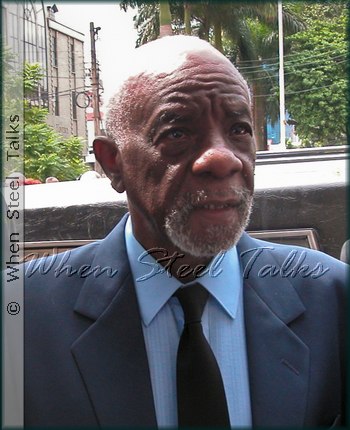Global - Les Slater, chair of the T&T Folk Arts Institute in New York and a former Highlanders arranger, is hard-pressed to bring up much of his childhood without including “big brother” Bertie Marshall. The emblematic tuner served as the force behind the revamped steel band that Kim Loy Wong started more than half a century ago and left dismantled when he immigrated to New York in 1958.
Slater is paying tribute to the demanding innovator and leader, who would have turned 77 today had he not fallen to a stroke last October in Port of Spain, Trinidad.
“Growing up meant Bertie was always around,” said Slater of his childhood neighbor and mentor.
Junior to Marshall by about four years, Slater enjoyed his protection in the schoolyard throughout his formative years. As they grew older, Slater could testify to his friend’s experimental phase, having witnessed those beginnings. Early undertakings included stretching a piece of rubber across the top of a powdered milk container to find the limits of rhythm. Another ingenious scheme had Marshall running a wire close to the circuitry of a national broadcast relay service, trademarked as Rediffusion, so he could tap into that source and somehow pick up a feed on a crystal radio.
“His skill was the manifestation of early genius that I saw,” Slater said, “as was the interest he developed in crystal radios. Once, he put together a movie projector - a lot of it done from scratch - threading the film through a piece of aluminum that [facilitated] screening.”
Such ability left Slater in awe of his friend, whose creativity belonged at a higher level than was the norm for his peers.
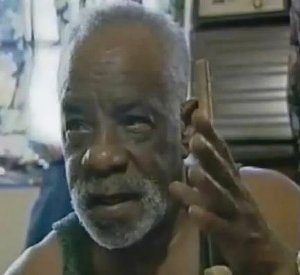
Bertie Marshall
For Marshall had also mastered the slide key chromatic harmonica, which wasn’t a toy to him, the way the mouth organ served the youth of the land. It would guide him on a path that he seemed destined to follow.
He had help along the way, though. A man of Portuguese descent, a worker on the wharf who lived nearby, moved to push Marshall’s development in experiments. But, with Marshall leaving high school, he arranged instead for him to get a job at Port Services.
Meanwhile, Desperadoes arranger Robert Greenidge’s uncle Carl Greenidge, a good tuner (and excellent player) had been instructing Marshall all along about the art of tuning the oil drum. As it turned out, one of the first bands Marshall put together was with mentor Greenidge.
It didn’t surprise Slater at all that when Marshall got into pan he would be exceptional.
“When I ask a fella to play a C note on a pan and I play the same note on the harmonica I realize that something was wrong.” That’s Marshall explaining why he felt the need to induce harmonics out of steel – a process that led to his invention of the modern-day steel band.

Les Slater
That Slater became an arranger was evident by not only an interest in jazz and Latin music, but also his curiosity in the sound that Marshall coaxed from the drum. Slater would crawl through the space below Marshall’s house at the corner of Erica Street and Old St. Joseph Road, Success Village, Laventille, where the instruments were stashed, just to steal a chance at playing them without interference. Back then, teens playing pan was an anathema to parents.
In time, Slater could afford to call himself a panman, at first accompanying Marshall’s Elite Steel Band with the rhythmic shake of the maracas, then, in short order, catching Marshall’s ear about an idea for a particular piece of music.
“And I said, ‘here’s what I want done,’ and Bertie would say to the band, ‘he could arrange, man.’”
Thereupon Marshall nicknamed him Professor, not for that but for his bookish demeanour - Slater has always worn glasses.
Marshall trusted him to arrange music for his Armed Forces band that played gigs at the American naval base in Chaguaramas. But Slater’s burning ambition after he graduated was to orchestrate his own band. He was employed now and could afford Marshall’s pans.
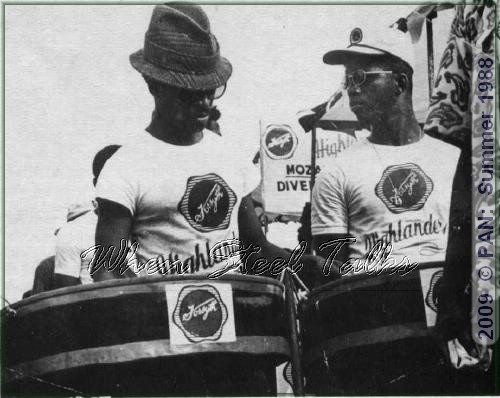
Highlanders during Carnival 1971 in Trinidad
“That’s how Wolverines started,” said Slater, who played double tenor, a Marshall brainchild. “And when Kim Loy Wong returned from New York in 1961, he was so bowled over by the sound he wanted to resurrect Highlanders, which became Armed Forces Highlanders, an amalgamation of pan sides [coming out of] all the petty jealousy and parochial stuff going on.”
In 1962, Wong flew back to the States and the band was restored as Highlanders. The celebration began right away with Slater’s jazzy phrasing of Waltz from the Opera Faust, the Bomb song for the Carnival that endeared spectators to the new band.
“Bertie and I were so much in sync - he likes bebop, too. The relationship was such that even if he started a tune on his own and he got to the bridge and did not know how he wanted to proceed, when I walked into the yard he would say, ‘we waiting for you and we have no idea where to go with this.’”
When Slater suggested a counterpoint for the bass at the bridge, Marshall would exult, ‘this is it.’
Slater also recalled the recording session when the band was stuck for an intro for Melody in F. They waited for the “professor” to arrive and save the moment like a comic book adventure hero.
“He was confident that when I bring something, any music, it was [what] he liked,” Slater said.
In 1964, his mother in failing health, Slater arranged Mama Dis Is Man, and helped to phrase a section of Gypsy Rondo, which was arranged by Marshall, William Phillip and a few other band members. Later in the year, Slater arranged much of the music on the all-time favorite pan album that saw many a hit rise to the Top Ten on the local charts.
There was no day, Slater said, that one of the songs wasn’t played on radio. Highlanders amplified its lead pan and generated as much buzz in fetes as it did on the road, so mesmerizing was the band’s tone and musical style.
“Bertie was not celebrated enough as an arranger,” Slater admits, “because he was so outstanding as a builder of pans. Every note had to be perfect, or else he continued to pound and pound. So his musicality got short-thrifted. He was an excellent player on the soprano and double tenor pans. His harmonica playing had something to do with it. Maybe he got kind of an instinctive feel for chords, or it was the mentoring from Carl Greenidge.’
There were others from whom, sponge-like, Marshall soaked up what he could to enhance his musical awareness. He tapped into pianist Aldwin Albino’s musical head (Albino’s mother and his mother being good friends) and got some pointers from him about chord structure. This was in the early ‘50s.
In 1964, Slater migrated to Brooklyn and enrolled at New York University. One year later, he would learn about the deepening respect for the band as it played the now signature Bomb song, Handel’s Every Valley Shall Be Exalted.
“I was on campus, and suddenly it hit me, ‘look where I am and look what’s happening home.”
It was a happening all right. The imaginative genius of Marshall and Phillip captivated audiences along the J’ouvert parade route. Handel’s music on steel titillated the priests at a downtown cathedral. It still resonates from the top drawer of pan songs anywhere, the distinctive amplification of Marshall’s harmonics earning its place in the pantheon of history.
Double tenor player Herman “Ushkay” Thomas allows as how Marshall chipped in with the rephrasing and accents on not only that Bomb song but on the 1967 winner, Rossini’s Italian Girl in Algiers as well. “Phillip arranged that one, too,” he says.
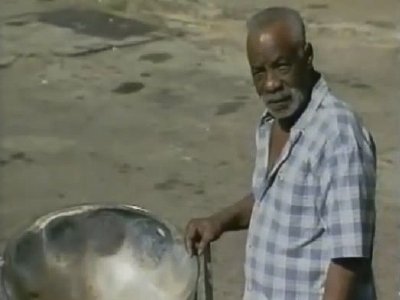
Bertie Marshall
Perhaps Marshall’s best innovation might have been the Bertfone. He always wanted to find a way to cut off the tone of a note, Slater said. “Although the Bertfone didn’t become a fait accompli until, I believe, after 1970, the concept was something he had talked about since before I left in ’64. He was fascinated with the idea of having a ‘damper’ effect that would control the resonance of notes.
The Bertfone, an amplified double tenor with a real organ effect, was instrumental in a Marshall plan to downsize the steel band while improving tone and power.
“My personal take on the life and demise of the Bertfone: That the loss of this stunning creation in a fire went by with hardly a whimper was one of the most glaring examples of indifference to artistic enterprise and genius in T&T. Bertie had demonstrated the instrument, I believe more than once, on TV; it wasn’t exactly a secret. That Bertie’s misfortune and what the loss of the Bertfone meant for our pan culture didn’t strike more of a chord in the society spoke volumes.”
Marshall said in a documentary interview that he’d requested from then prime minister Dr. Eric Williams sufficient funds to continue his experiment. He carried the rebuff in his heart till the day he died.
Marshall made no secret that he feared no one, let alone the leader of the nation. His attitude and language reflected in his impatience with players who were slow or didn’t hew to the tenets of perfection.
“He’d say, ‘I’ll show you one more time, and if you don’t get it, out my yard,’ Slater recalled. “He didn’t suffer fools gladly.”
And you’d better stick to Marshall’s style of phrasing. He had a staccato rhythm and never went the way of All Stars or Ebonites, rolling or elongating the notes, Thomas said.
Marshall’s fierce discipline as a tuner might well have transitioned to his unique style of managing the band. So it was difficult for him to rein himself in, as when he indulged in his uncommon art of calling down players, even arrangers, for inaccuracies.
He did so with wisdom and gall in juxtaposition. His delivery might have been coarse but it made for a funny moment in the yard, cracking up players and listeners.
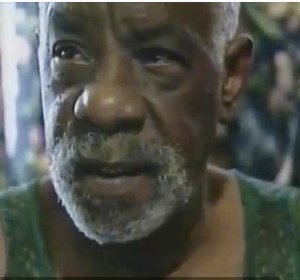
Bertie Marshall
Hear Thomas: “The band is practicing with a big crowd on hand, and suddenly he looks out the window and bawls: ‘What is that B all yuh playing dey? Man, that is a bullerman [womanish] B; try the B-flat.’ And he gone back inside doing whatever it is he was doing.”
“He didn’t care. That was his style.”
The confidence that only grew as he was proving himself a true pan master lent greater swagger to what he already possessed - not taking crap from any quarter, Slater concedes. “He was quite comfortable wearing this as a badge of honor: ‘They know I is ah Hitler.’ [His] moniker, The Madman, was something he seemed to revel in.
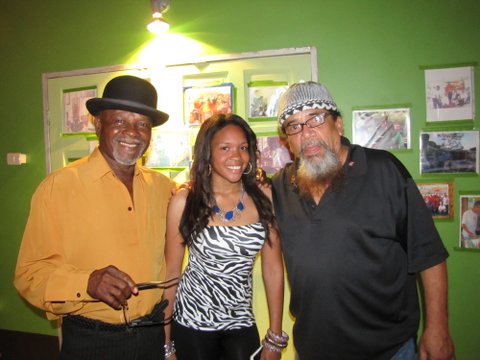
(from left to right) Lord Superior, Marshall’s granddaughter Damara Marshall & Calypso Crazy - at February 4 event in honor of what would have been the pan icon’s 77th birthday (February 6) - image courtesy Cathy George
But never once did Marshall revel in birthdays. Not that they rubbed up too close to the Carnival. Perhaps it was out of respect to his gnarly character.
So it mattered not whether you wished him Happy Birthday. As Tony Slater, a tuning assistant once said, “he’ll argue all day if you [groove] a note too small. All day.”
And though he didn’t care which way the wind blew, it seemed, at last, that everybody grew to love Bertie Marshall.
“All tuners became my friend,” he bragged.
To all of them, too, add one more candle to the cake.
Please.
_______________
** Bertie Marshall - The Steel Pan Visionary
** 2013 tune: One For Bertie

Dalton Narine
Dalton Narine is a Miami writer and filmmaker, whose worldwide award-winning film Mas Man - The Complete Work, about Peter Minshall, the Trinidad Carnival artist and Olympic Games Opening Ceremonies legend, is available on home video as a three-disc set at masmanthemovie.com
Contact Dalton Narine:
narain67@gmail.com
Editor’s note: Trinidad & Tobago’s 2013 National Panorama Finals are dedicated to Bertie Marshall
Click for WST’s Trinidad and Tobago Panorama 2013 coverage
Leave a comment in the WST forum







